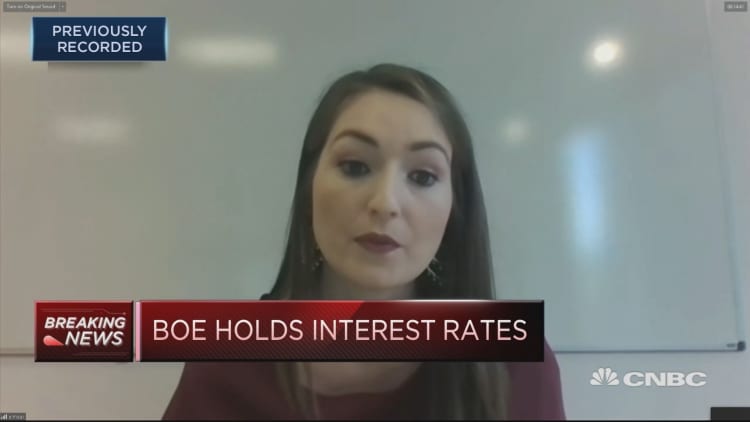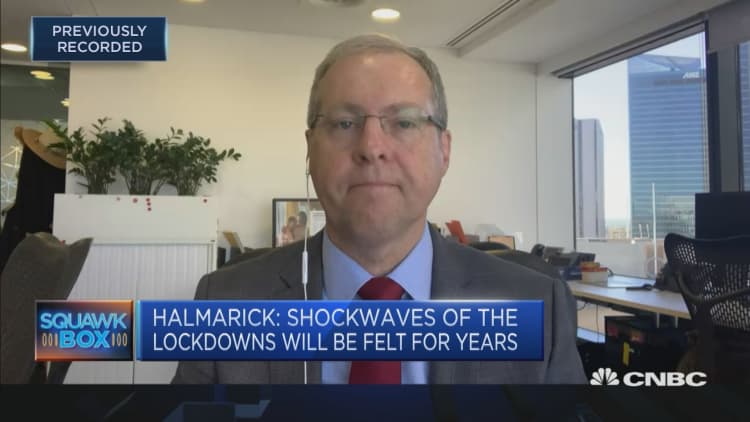
LONDON - The Bank of England on Thursday left interest rates unchanged and maintained its current level of asset purchases, but warned that the outlook for the economy remains "unusually uncertain."
All members of the Monetary Policy Committee (MPC) voted to keep the main lending rate at 0.1%, with the central bank having cut rates twice from 0.75% since the beginning of the pandemic. The MPC also voted unanimously to maintain target for the total stock of its bond purchases at £745 billion ($960.8 billion).
The Bank of England also revealed that the MPC had been briefed on the Bank's plans to explore how a negative bank rate could be implemented effectively, meaning it is now openly considering how to use negative interest rates.
Sterling fell by around 0.6% against the dollar in the wake of the announcement.
Britain faces concurrent risks of a no-deal Brexit, a spike in coronavirus cases leading to the reintroduction of some social restrictions, and the end of the government's furlough scheme next month, which had supported millions of dormant workers during the pandemic.
After plunging a record 20.4% in the second quarter to officially enter recession, the U.K. economy saw signs of recovery with a 6.6% monthly expansion in July, after nationwide lockdown measures were gradually lifted.
However, a spike in cases to more than 3,000 per day has forced the government to implement new rules on social gatherings and implement localized lockdowns in certain regions, casting doubt over the country's recovery.
"The recent increases in Covid-19 cases in some parts of the world, including the United Kingdom, have the potential to weigh further on economic activity, albeit probably on a lesser scale than seen earlier in the year," the Bank said in its summary.
It added that there remains a risk of a "more persistent period of elevated unemployment than in the central projection."
Despite stronger-than-expected domestic economic data in recent months, the central bank said the economic outlook remains "unusually uncertain," as its central assumptions include a free trade deal with the European Union coming into effect on January 1 and a gradual dissipation of the impact of Covid-19.
The MPC also said it does not intend to tighten monetary policy until there is "clear evidence that significant progress is being made in eliminating spare capacity and achieving the 2% inflation target sustainably."
'Unenviable choice'
Vivek Paul, U.K. chief investment strategist at BlackRock Investment Institute, said the employment figures to date do not tell the full story given recent headlines about the amount of British firms considering redundancies, and expects the headline unemployment figure to rise "materially" in the fourth quarter.

"The global policy revolution, where central banks and governments have taken unprecedented measures to support economies and of which the UK's furlough scheme is a prime example, has been the bedrock of the strong risk-asset rally in recent months — but the potential for premature withdrawal of stimulus is a big risk to markets and the economy," Paul said.
"The Bank of England and the U.K. government face the unenviable choice between either being accused of premature policy withdrawal, or having extended stimulus to the point that it becomes incredibly difficult to unwind in future."
He added that if Brexit talks collapse or Covid-19 cases rise significantly through the winter, calls for further intervention will become stronger.
Negative rates back in play?
Giles Coghlan, chief currency analyst at HYCM, anticipates that negative rates could be seen in February 2021.
The Bank now projects that third-quarter GDP will be around 7% below the level seen in the fourth quarter of 2019, slightly stronger than previously expected.
"With Brexit risks ahead the Bank of England face further possible headwinds. They said that investment intentions remain very weak and uncertainties among businesses were elevated," Coghlan said.
"All in all, this is a Bank preparing for tough days ahead, especially as job redundancies could rise to 735,000 this year according to the Institute for Employment Studies after a Freedom of Information request obtained by the BBC."


